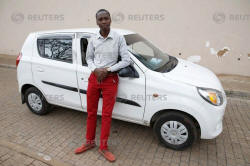Carmakers lure ride-hailer, delivery drivers in Africa
 Send a link to a friend
Send a link to a friend
 [November 09, 2018]
By Duncan Miriri [November 09, 2018]
By Duncan Miriri
NAIROBI (Reuters) - At Suzuki Motor Corp's
<7269.T> showroom in the Kenyan capital, hundreds of its Alto compact
cars are waiting to be collected.
Most of the customers are drivers for ride-hailing company Uber
Technologies [UBER.UL], which struck a loans and discount deal with the
Japanese carmaker and South Africa's Stanbic Bank <SBKJ.J>, at the
beginning of the year.
Africa should be a huge growth market for automakers. Transport links
are weak and personal car ownership is low. There are 25 cars per 1000
Kenyans compared to 786 in the United States, according to the World
Bank. But many in Africa cannot afford to buy a vehicle, particularly
just for personal use.
The Alto deal in Kenya, soon to be extended to Uganda and Tanzania,
offers financing of up to 100 percent for top-rated Uber drivers and a
price of 850,000 Kenyan shillings ($8,349.71), lower than the usual
950,000 shillings. The loans are repaid with the money the driver earns
providing services.
Patrick Amenya, the sales director at CMC Motors, the local Suzuki
franchisee, said the deal had helped him sell "more vehicles than
normally we would." Suzuki sold 523 Altos in Kenya this year.

Auto companies are linking up with fast-growing ride-hailing or delivery
services around the world, aiming to transform a threat to their
business into a growth opportunity. They offer discounts or financing
deals for drivers in the hope they will pick their cars or vans, which
could also encourage their clients to buy them.
General Motors Co <GM.N> has invested in U.S. ride services firm Lyft
and Toyota is also backing Uber. Japan's SoftBank Group Corp <9984.T> is
also an investor in Uber and Southeast Asia's ride-sharing app Grab.
Five blocks from CMC in Nairobi, at Toyota Motor Corp's <7203.T>
showroom light trucks and bikes are waiting for buyers. Some of these
are drivers for Sendy, a local online delivery company. Like Uber, its
drivers own their vehicles.
Companies are becoming less likely to buy their own fleet of trucks,
preferring a delivery service instead, said Dennis Awori, the chairman
of Toyota East Africa, a Sendy investor.
Toyota provides Sendy with a pipeline of truck owners. At the moment
there is no financing deal or discount but Awori and Malaika Judd,
Sendy's chief operating officer, said this was under consideration.
SECOND HAND MARKET
Suzuki's strategy has propelled it from the bottom of sales tables in
Kenya, where it languished for decades with emerging brands from China,
to the top five along with Toyota, Isuzu, Mitsubishi and Ford.
Koichi Suzuki, Suzuki's manager for the Middle East and Africa, hopes it
will soon have the edge over the others. The company is planning to
adopt the same strategy in other markets.
The Altos, which are tough and fuel-efficient, at CMC are made in India
but could one day be made in Africa, Suzuki said.
[to top of second column] |

Kenyan Uber driver Joe Wanyoike poses next to his car during an
interview with Reuters in Nairobi, Kenya, October 29, 2018. REUTERS/Baz
Ratner

Nairobi is often a springboard for the rest of Africa and Uber, operates in
seven African nations and 13 cities, offering employment to more than 100,000
drivers.
"When you have a success story in one country in Africa, we can help to develop
to a pan-African scale," said Richard Bielle, head of Toyota's business in
Africa.
Germany's Volkswagen AG <VOWG_p.DE>, invested $50 million in a plant in Rwanda
this year to assemble its Polo, Passat and Terramont models. It also set up a
ride-hailing app called VW Mobility Solutions as no other service is available
there yet.
"Most of the people might not be able to afford a brand-new car so the question
is how do we do satisfy that market?," said Michaella Rugwizangoga, CEO of VW
Mobility Solutions.
"Our business model is to use the locally assembled VW vehicles to deliver our
solutions for two years and sell them as second hand cars to the market."
NEW CAR
Kenya's car market is dominated by second-hand imports, said Mariane Ochieng,
Stanbic's head of vehicle and asset finance.
New vehicles are perceived as being out of reach of many buyers, mainly due to
the higher taxes that they attract, she said.
Like millions of other young Kenyans, 25-year old Joe Wanyoike was forced into
self-employment after a futile search for work when he finished secondary school
in 2011.
He turned to a pre-owned vehicle imported from Japan which he hired at 50,000
shillings ($490.44) a month, and signed up on Uber to carry customers.
The company shared Wanyoike's data on number of trips, earnings and his rating
of 4.7, near the maximum that is 5.0, with Stanbic Bank. This earned him a loan
for a new Alto, allowing him to save money on fuel and more easily navigate
Nairobi's clogged streets.
"I'm very happy because I could not afford a new car," he said.

After the Alto's success, CMC Motors has started discussions with Uber to
increase the range of models available.
"Everybody was a bit nervous about whether it could work but now we are all
seeing the possibilities," said Amenya.
(Editing by Anna Willard)
[© 2018 Thomson Reuters. All rights
reserved.] Copyright 2018 Reuters. All rights reserved. This material may not be published,
broadcast, rewritten or redistributed.
Thompson Reuters is solely responsible for this content. |